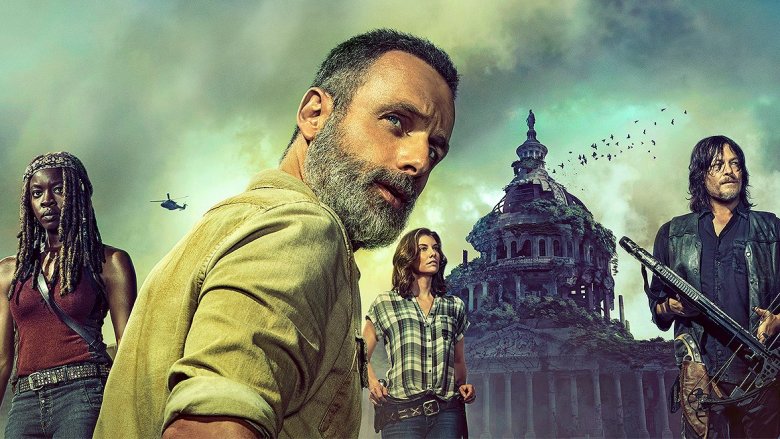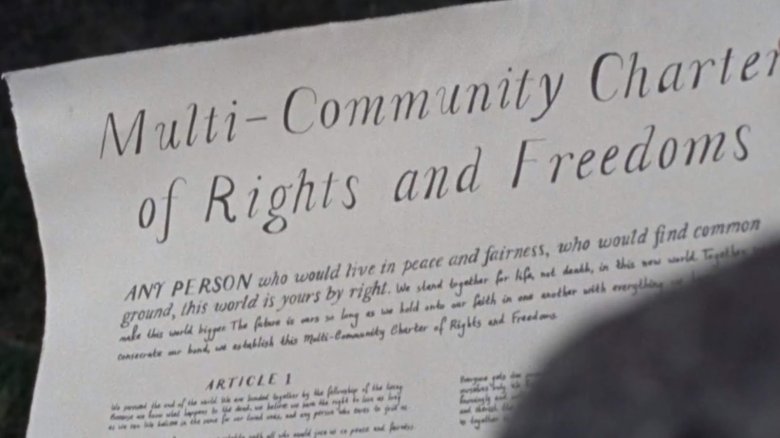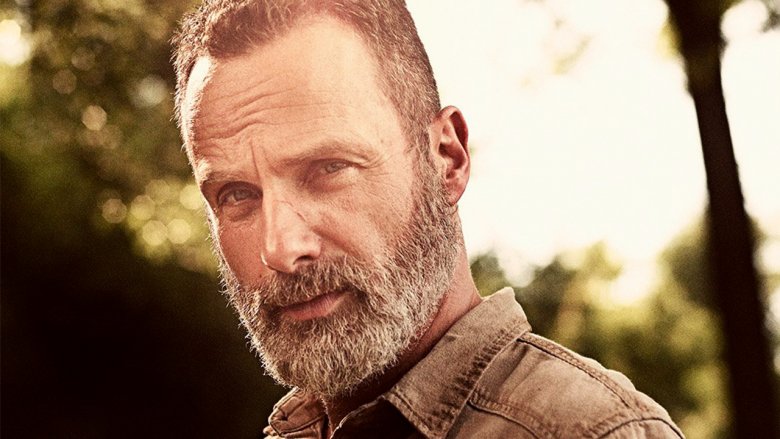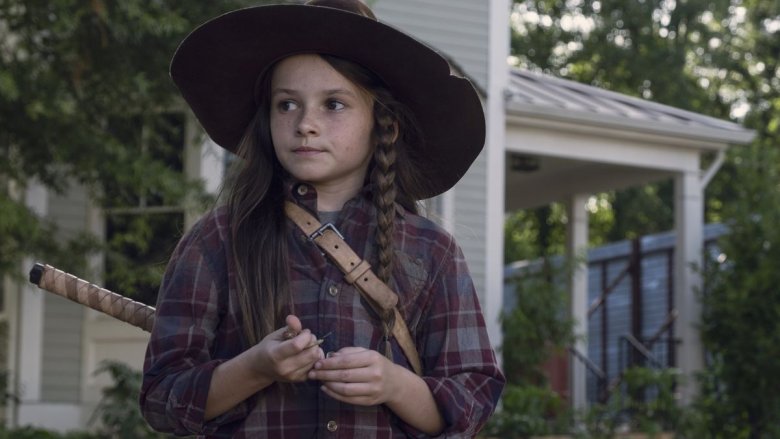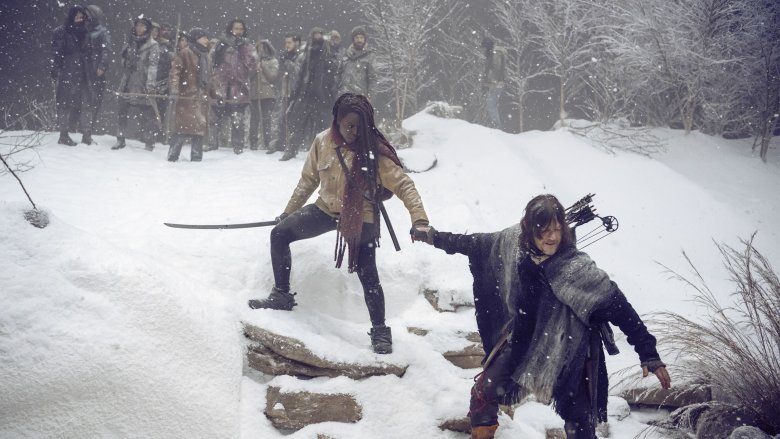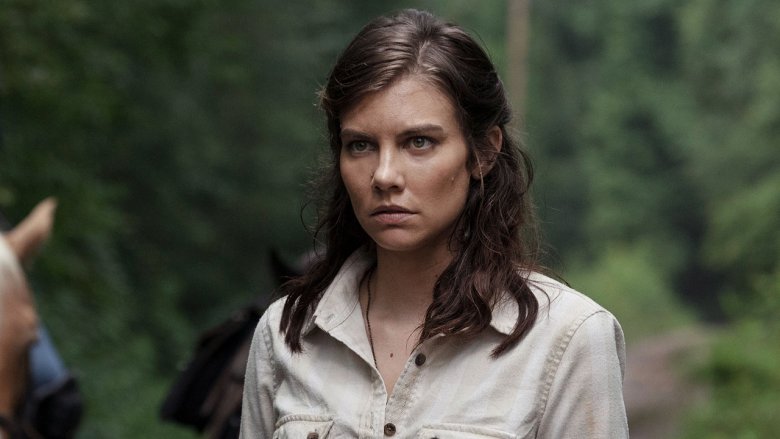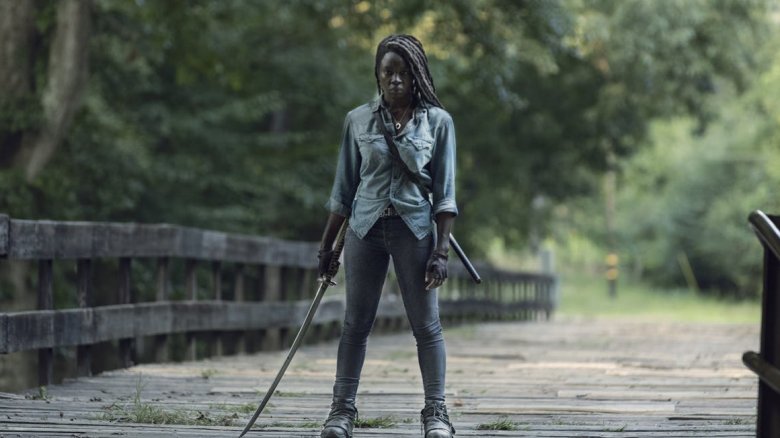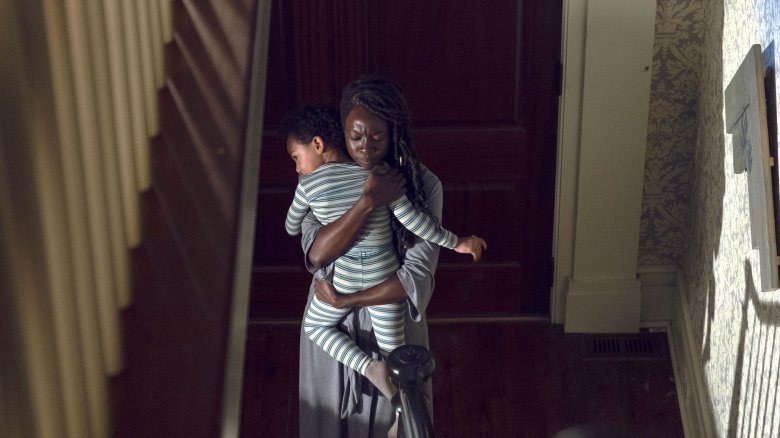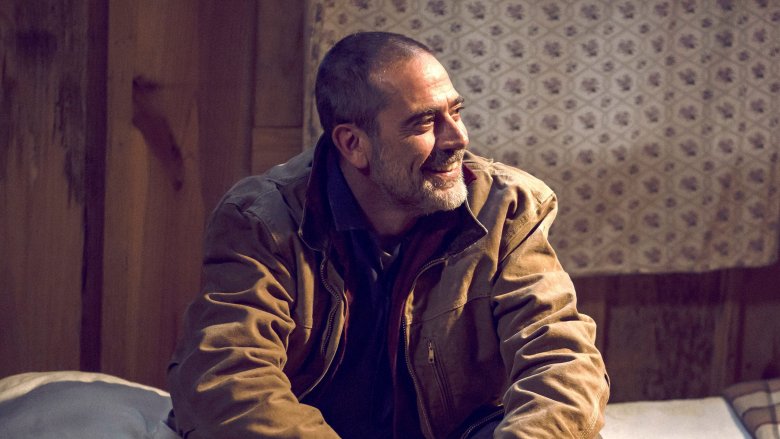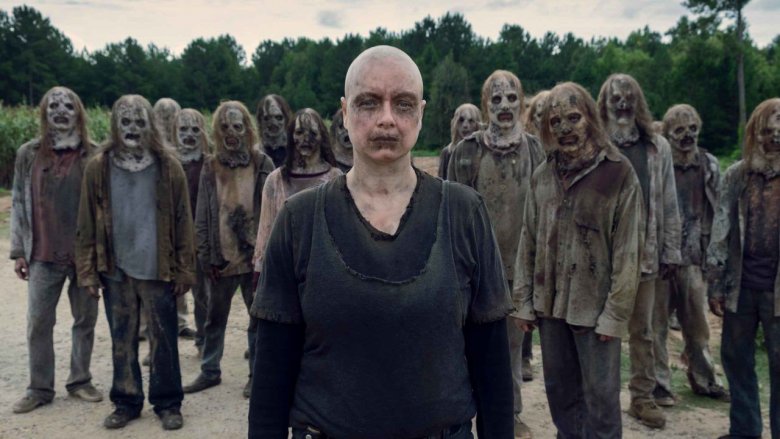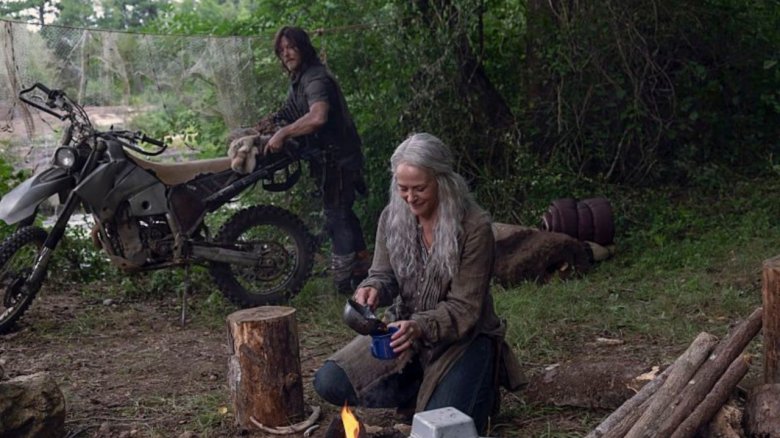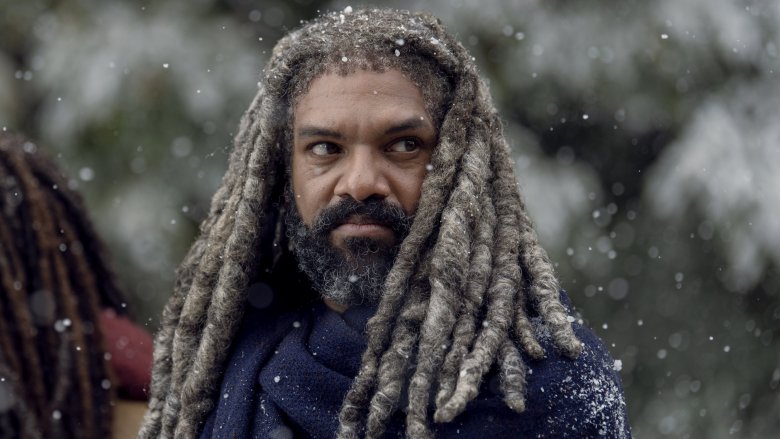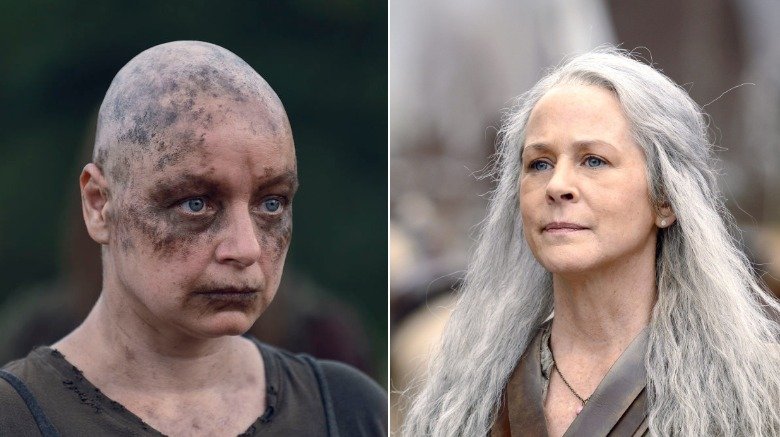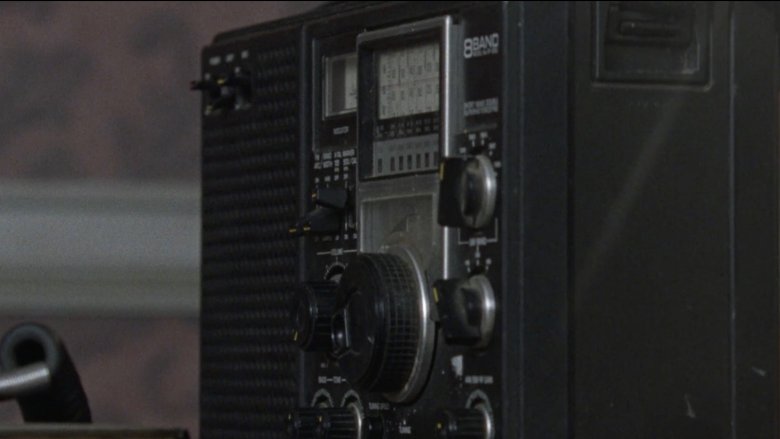How Season 9 Saved The Walking Dead For Now
AMC's zombie drama The Walking Dead has been making headlines for a while now — and not always for good reasons. On one hand, the show's viewership has dipped from those heady days when its average audience peaked just shy of a staggering 15 million viewers. On the other hand, the network has kept the internet abuzz with a steady string of announcements regarding their ambitious future plans for the show and the post-apocalyptic franchise it's kicked off.
The show's dwindling viewership and the network's grandiose long-term plans might seem to be at odds, especially throughout seasons seven and eight, as Negan and his Saviors barreled onto the scene and brought the show's momentum to a screeching halt. But more recently, a glimmer of hope has suggested that maybe the show isn't quite on its last legs... yet.
Season 9 featured the debut of new Walking Dead showrunner Angela Kang, who brought a slew of changes and developments that seem to have breathed some life back into the story. With that in mind, let's take a look at all the ways The Walking Dead's ninth season marked a creative rebound for the series — and may have saved it for now.
Expanding the narrative
Since season 6, The Walking Dead has been slowly building up a loose network of communities that includes Hilltop Colony, Alexandria, the Kingdom, the Sanctuary, and Oceanside. Season 8 saw these communities go to war with one another, but season 9 picked up after the last shots had been fired, and it showcased the communities as they attempted to integrate into a cohesive unit that could support one another.
While this unifying process saw its ups and downs throughout the season, by the end of it all a charter had been signed and each group was ready to support the other — with the exception of the Sanctuary, which didn't technically exist anymore. This cessation of inward fighting set things up for an outward expansion in the future, with a larger group of people forming the central core of the show and prepared to take on the threats that they collectively face with a unified front.
Of course, there's an argument to be made for the point of view that season 4 got better after the prison became untenable and the group was scattered — basically the opposite of what happened in season 9. But at this point, it's hard to have such a completely destructive event take place with so many people over such a huge area. Unifying them and putting an end to the constant infighting was a smart move that should pave the way for the show to gain momentum moving forward.
The Rick Grimes saga
The Walking Dead juggles a ton of different characters. However, if there's one man that stands above everyone else, it's Rick Grimes. Naturally, his departure five episodes into season 9 was a really, really big deal. It was hyped as a major event for the season, and sure enough, it ended up being a turning point.
While everyone was expecting to see their favorite sheriff's deputy go down in that glorious last stand on the bridge, though, it turned out to be the flashpoint for a much bigger reveal. Washed downstream and somehow still alive (seriously, the guy had lost a lot of blood at that point), Rick was picked up by a mysterious chopper after Jadis informed the occupants over the radio that he was "a B," which... what? Before everyone could get over the shock, he was gone. Just like that. Gone.
Of course, it was afterward revealed that Rick will go on to headline his own trio of films that will play in theaters. If you're looking for ways to reignite the momentum of a decade-old show, splitting off the lead character into a separate yet connected storyline is definitely one of the more unexpected options, and it's likely to keep fans on the edge of their seats.
Time jumping
While the past few seasons had spent the bulk of their time tethered to and inching through the Saviors storyline, season 9 saw the writers find a whole new lease on life. They recklessly zoomed ahead in time more than once, and in the process, broke some of that static friction that was bogging things down. The first major time jump took place right upfront in the season premiere, which picked up the storyline a full year and a half after the final moments of season 8.
It wasn't until Rick disappeared into the unknown with Jadis several episodes later, though, that they really let things off the leash. Before that episode ended, the story jumped six years into the future. And while the pace slowed down a bit for the rest of the season, there was one more jump at the end: The final episode, "The Storm," saw yet another leap, this time a few months into the future.
This newfound willingness to time-hop at will brought a sense of mystery and excitement to the season. It gave the writers permission to skip over the slow stuff and get right on to the action. It looks like Kang isn't showing any signs of slowing the pace, either — season 10 is set to start a few months after the season 9 finale.
Environmentally unfriendly
Another fairly new element at play during season 9 was the environment itself. That's not to say that the characters' surroundings haven't played an important part in the story up until now, but not to the level that it was taken in season 9. Particularly after jumping six years into the future, we started to see some gruesomely fascinating things about what happens to zombies after they've been shuffling along for such an incredibly long time. Take, for instance, the unsettling fact that some of them grow right into the trees.
The time factor aside, though, we also got our first serious dose of winter weather at the end of The Walking Dead season 9, and it made for some fun times. After years of both living and undead villains providing the primary danger, we finally got to see Mother Nature get a turn at bat. And the best part is, it looks like we'll be getting more of the same going forward. Kang has gone on record saying that "We're still exploring other kinds of environmental obstacles that we haven't done and seen before, so there will be some other new stuff to look out for."
Maggie's uncertain future
Longtime alumni Maggie Rhee was the other major character that saw her storyline come to an abrupt halt partway through The Walking Dead season 9. Once again, the writers couldn't find it in their hearts to kill off such a lucrative — er, compelling — character without being absolutely certain that they couldn't get Maggie portrayer Lauren Cohan back at some point. Instead, like Rick Grimes, Maggie was simply removed from the primary storyline after the six-year jump. From there, the writers resorted to making veiled references to her from time to time, clearly leaving the door open for a possible return.
And sure enough, just like Rick Grimes, it looks like we may not be done seeing the Hilltop matriarch quite yet. However, while Rick will get a trio of films all to himself, Maggie's return, if it happens, will likely be within the show itself. We already know that they're not done referencing her, at least, as her name has already come up in the season 10 promotional material. Putting a pin in Maggie's story and stashing her away for a possible future reveal was another savvy move that helped The Walking Dead season 9 build toward an increasingly intriguing future.
The rise of Michonne
Of course, the departure of two primary characters in Rick and Maggie naturally left a huge vacuum, and several characters had to step into the gap, including Michonne. The katana-wielding champion was quickly shown to be the primary mover and shaker for the Alexandria community in the years that followed Rick's apparent death. Not only did she guide her own people well, she also ended up also being one of the chief catalysts that drove their fellow communities apart before ultimately bringing them back together.
As if that wasn't enough, Michonne's future on the show has continued to attract the limelight in other ways, too. It has already been announced that The Walking Dead season 10 will lead to Michonne's own dramatic departure from the narrative as star Danai Guirira prepares to exit the show for bigger and better things. While her departure will leave yet another vacuum, so far the character has been instrumental in kickstarting the show's momentum again.
The Rick Grimes family tree
Rick Grimes may have wrapped up his arc on The Walking Dead in season 9, but his impact will continue to be felt for a very long time. And we're not just talking about vague remembrances or his own trio of films, either. We'll also be able to see Rick's legacy through his two children for the foreseeable future.
The six-year jump has already revealed a Judith Grimes as accurate with her shooting as she is clever with her speech. While she's still very young, it's not difficult to envision Judith playing a significant part in the show going forward — and potentially even opening up the doors to connect the main show to the TWD universe's latest spinoff, which is said to focus on the next generation that grows up after the zombie apocalypse has struck.
On top of all that, while Judith's development into a tenacious young gunslinger may not have been too much of a surprise, the sudden arrival of her little brother RJ sure was. While Rick Jr. hasn't had much screen time yet, the mere fact that a "Richonne" child exists and will one day stand by his sister's side should help keep the audience coming back in the future.
The caged one
Negan was already old news going into season 9. He had been around since the final moments of season 6, and had been a drag for quite a while at that point. His personality was simply so big, it needed to be removed if the show was ever going to reach the surface again before it ran out of air. Conventional wisdom would have dictated that a man willing to heartlessly bash people's heads in with a baseball bat would need to be killed off in order to move forward. But the writers opted for something different. Instead, they left Negan locked in a cell in Alexandria... for six years.
After all this time, it's still impossible to tell where they're going with this guy. So far, the lack of a villainous return has been a bit of a surprise. In fact, his heroic saving of Judith in the storm during the Walking Dead season 9 finale appeared to be a redemptive coming out party. But then Negan actor Jeffrey Dean Morgan went and shot the redemption narrative down by stating, "I don't know if it's much of a redemption arc, because I think he's always been who he is." Showrunner Kang added to the enigmatic aura by adding, "He's not the hero. He's, at best, an antihero." While the scenario could quickly become annoying if something doesn't resolve itself soon, up to this point Negan's character arc has certainly been interesting to watch unfold.
A new nemesis
It's a good thing that the threat of Negan seems pretty much put to bed at the moment because there's a new villain in town. Alpha and her army of skin-clad Whisperers showed up midway through season 9, and their arrival was electrifying. After years of dealing with cold, calculating humans in the form of the Saviors, the cannibals at Terminus, and the Governor, the rollout of the Whisperers in The Walking Dead season 9 unveiled a whole new category of villain.
Harsh, brutal, and animalistic, the new enemies quickly became a threat that couldn't easily be resolved through peaceful negotiations or traditional warfare. Throughout season 9, they threatened communities, killed off multiple characters, and finally, in the penultimate episode of the season, upped the ante by creating a gruesome border wall out of heads on pikes. But for all the violence, the true struggle with the Whisperers clearly still lies ahead, beckoning Walking Dead viewers to return to their television sets to see how things end up going when all-out war inevitably erupts.
Caryl
It would be hard to argue that the endlessly drawn-out romantic tension between Daryl and Carol is genuinely a primary factor in keeping The Walking Dead alive. The discussion of whether the two characters will ever finally hook up feels like beating a dead horse that was already beaten before, but that doesn't change the fact that the dynamic duo are still the two lone survivors of season 1, and they look like they're going to get some decent screentime going forward.
Carol ended The Walking Dead season 9 by losing her adopted son Henry, stepping down as queen, breaking up with King Ezekiel, and taking Lydia under her wing. The resilient heroine has been a compelling character since her first moments on the show, and seeing where her path ultimately leads is still one of the main attractions.
And then there's Daryl. The darling of the apocalypse, in season 9 Daryl spent time unwillingly leading the Sanctuary at Rick's request before he lone-wolfed it for the rest of the season, only reluctantly coming out of his self-imposed exile when he saw that his help was needed. Add onto that the fact that TWD boss Scott Gimple said he "can't rule...out" a reunion of Daryl and Rick in the future, and the story of everyone's favorite post-apocalyptic recluse just keeps on getting better.
The fall of the Kingdom
The Kingdom has been an important political presence on The Walking Dead for a while now. While communities like Alexandria, Hilltop, and Oceanside fought for straight-up independence from Negan's rule, the Kingdom always played more of the role of an equal or a peer to the neighboring Saviors. Yes, they felt pressured by them, but there was always a sense of strained respect — that is, until the Kingdom joined in the all-out war against the Saviors in season 8.
By the time the six-year jump took place in The Walking Dead season 9, the once-thriving Kingdom was revealed to be a husk of its former robust glory. While a failing boiler is emphasized as the chief issue they're dealing with, it clearly reflects the condition of the facilities as a whole. The damage is bad enough that by the stormy finale, the entire community abandons the smoking wreckage of their home and relocates to Hilltop. This mass migration of people is a new development for The Walking Dead, and one that will certainly be interesting to watch as these two groups of people get used to sharing such close quarters.
A tale of two mothers
Carol taking Lydia under her wing by the end of The Walking Dead season 9 is only part of the story. Of course, Lydia is Alpha's biological daughter too, and the villainous mother clearly wasn't happy to see her daughter converted to the heroes' cause. In fact, she was so upset by the entire affair that she went and killed her daughter's love interest, Henry, and posted his head on her border wall.
Lydia is angry at her mother for killing Henry and threatening her new life. Carol is also furious about Henry's death, while simultaneously developing a motherly care for the daughter of her son's murderer. Alpha is severely displeased to have lost her alienated daughter and sees Carol as a threat to her maternal influence. The point is, the strange triangle of relationships between these women is all sorts of confusing, and it will clearly play into the narrative going forward. After all, the situation can't stay this way for long without something happening, and according to the promotional material, it looks like something will.
Ah, the mystery
The Walking Dead season 9 ended with a string of mysterious setups that, while a bit cliche, left fans wondering where they would lead. As the season faded, the Whisperers returned to the area after a winter hiatus, clearly ready to tangle once again. And don't forget that radio communication. The finale ominously closed with a mysterious voice on Eugene's radio blurting out "Hello? Hello? Calling out live on the open air. Is anybody out there?"
There's little doubt that season 9 shook up the formula for The Walking Dead — and at just the right time, too. Now, with season 9 under their belts and gobs of material still planned for the future, the creators get to run with a plethora of new story leads and see if they can maintain the fresh momentum they've created. The question is, has this dynamic new era genuinely given the show a new lease on life? Or is it already over, and we're merely witnessing the first rumblings of its shift to the undead?
